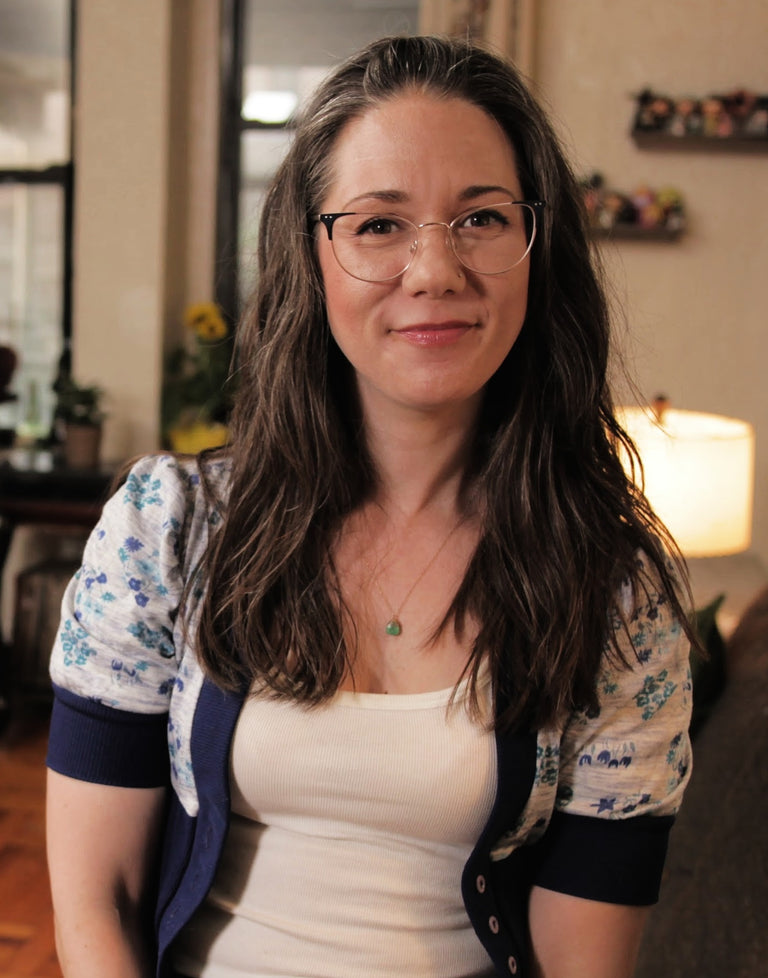If you’ve noticed your hair is feeling thinner all of a sudden, you’re not alone. About half of the population will experience hair thinning at some point in their lives, and many will have to manage ongoing thinning and changes in their hair.
What might be causing your hair to feel thinner? Can thinning be prevented or treated? When should you see a doctor? Read on to understand some of the most common causes for hair thinning, plus find out what you can do to get thicker, fuller looking hair.
How to Tell If Your Hair Is Thinning
First things first: let’s talk about normal hair shedding. Hair shedding is a completely normal part of the healthy hair follicle’s cycle. Each follicle cycles through stages of active growth, rest and hair fall. On any given day you could lose 50-100 hairs and it's completely normal.
Most people are in tune with their day-to-day shedding, so if you notice something looks (or feels) different, there is probably a good reason to pause and pay closer attention.
So how can you tell if your hair is thinning? Here are a few signs to look for:
- Clumps of hair in your brush and shower drain
- Your ponytail feels smaller, and/or it takes more turns of your hair tie than it used to
- If you’re seeing more scalp than you're used to when combing or sectioning hair, or if your part is widening
- Hair feels lighter or less dense
- Your hair just doesn’t hold heat styling as well as it used to
Shop: The Best Shampoos for Thinning Hair
Why Might My Hair Be Thinning? 8 Possible Reasons
Thinning can mean less actual hair on your scalp (less hair density), but it can also mean a change in individual strands' thickness and texture. Both can make your hair feel thinner, and getting to the root of the problem is the first step to finding a solution. Here are a few of the major underlying causes of thinning hair:
1. Age & Genetics
Aging and genetics are the most common causes of thinning hair. Androgenetic alopecia, also known as pattern hair loss, affects about 50 million men and 30 million women in the United States. “This condition causes gradual hair thinning due to changes to the hair follicles over time,” said Dr. Edward Salko, a board-certified physician and the Medical Director of PERSONALABS™.
2. Hormones
Hormones play an important role in hair growth, and hormonal fluctuations can directly impact our follicles. Pregnancy, giving birth, starting or stopping birth control and polycystic ovarian syndrome (PCOS) can cause hormonal shifts that might cause hair thinning in women.
More: How Hormones Impact Your Hair
3. Stress
Stress can impact our health in many different ways, and hair health is no exception. The most common way stress impacts hair is by triggering a sudden bout of excessive hair shedding called telogen effluvium. This condition can make your hair noticeably thinner, but thankfully it’s a condition that is typically only temporary and resolves on its own.
Shop: Ashley Petrone's Top VEGAMOUR Picks
4. Medical Conditions
A variety of health conditions could impact your hair follicles, though there are a handful of conditions that are most commonly associated with thinning.
“Autoimmune conditions can cause hair thinning or loss when immune cells attack your hair follicles, which leads to hair loss,” said Dr. Salko. Conditions like alopecia areata and lupus could cause loss or thinning, but there are other autoimmune conditions that could impact follicles. Diabetes and thyroid disease like Hashimoto’s or Graves’ might also impact hair follicles.
5. Medications
While chemotherapy is perhaps the most well-known medication for causing hair loss, others might include:
- Thyroid medications
- Birth control pills or other forms of birth control
- Beta-blockers
- Anticonvulsants
- Antidepressants
- Anticoagulants (blood thinners)
If you’ve started a medication and are noticing a drastic increase in hair shedding or hair breakage, be sure to speak with your doctor before stopping or otherwise changing your regimen.
6. Nutritional Deficiencies
Another common source of increased hair fall or thinning could be an underlying deficiency. Since our hair follicles need a number of different vitamins, minerals and nutrients for optimal functioning, if any one nutrient is lacking it can take a toll on hair growth.
Deficiencies in iron, zinc, protein and B12 could be among the most common linked to hair shedding, but another vitamin deficiency could be at play, too. Eating a healthy balanced diet is the best way to give your body the nutrients it needs, but adding a hair-friendly supplement like a biotin-rich hair vitamin could be an additional way to support your return to hair health.
7. Harsh Hair Styling
How you care for and style our hair can also have direct impacts on your follicles.
“Traction alopecia is the consequence of having your hair pulled consistently due to tight hairstyles,” said Dr. Salko. Over time tight hairstyles like buns, braids and extensions can stress out follicles to the point where they might stop growing hair. This damage to follicles can be irreversible if your styling habits don't change.
8. Seasonal Hair Loss
While there hasn’t been a lot of research looking specifically at the impact seasonal changes have on hair growth, there is a lot of anecdotal evidence supporting that some people experience increased hair shedding with changes in the seasons.
Can Hair Thinning Be Prevented?
This really depends on what is causing the thinning to begin with. In some cases, focusing on a holistic approach to health that includes lots of sleep, exercise, a hair-friendly biotin supplement, stress management and a healthy diet could offer protection against some forms of thinning due to stress or nutritional deficiencies.
In other cases, if the underlying cause is a medical condition or a medication, addressing this head-on can often resolve thinning. Sometimes, however, thinning is a result of aging and genetics, a form of hair loss called androgenetic alopecia. While you cannot prevent hair loss in this case, there are several treatment options available for managing it.
Tips For Holistic Hair Health
One of the best ways to support optimal hair health and hair follicle function is to support your overall health and vitality. Hair health starts from the inside out!
How can you take a holistic approach to hair health? Hair experts agree on these pillars for general health and wellness:
- Get Good Sleep: Regular, adequate sleep is essential for healthy immune and brain function, clear skin, improved energy levels and, naturally, hair wellness.
- Manage Stress: Finding an accessible and enjoyable way to manage stress is vital, so experiment with getting more sunshine during the day and maybe even try meditation to help soothe your psyche and follicles.
- Exercise: Not only does exercise have myriad bodily benefits, but it also increases blood flow to your follicles for strong, healthy hair.
- Eat Well: A balanced and varied diet full of whole grains, leafy greens, healthy proteins and fats will keep your follicles nourished from the inside out.
- Be Patient: It will take time to see new hair, so be patient as you're waiting for new growth!
- Be Gentle: Keep harsh styling and chemicals to a minimum. Avoid hot tools. Use an all-natural, vegan moisturizing shampoo and conditioner designed to support thinning hair, and consider adding a serum for thinning hair to the mix to support your progress. Check out this before and after from a customer who used GRO Hair Serum consistently for over 90 days!
The Takeaway
Hair thinning can have several different underlying causes, some of which might require medical attention and/or ongoing management. If you think your hair is feeling thinner, your best bet is to consult with a dermatologist or your primary care doctor to uncover the root of the problem. You should also spend some time researching the best products for thinning hair and experiment to find what works best for you.
Regardless of the cause of thinner hair, you can support follicles by focusing on your overall health and wellness through sleep, exercise, diet and stress management.
#include-related-slider#
More From VEGAMOUR
Photo credit: Dilruba Sarıçimen/Pexels
Back



















